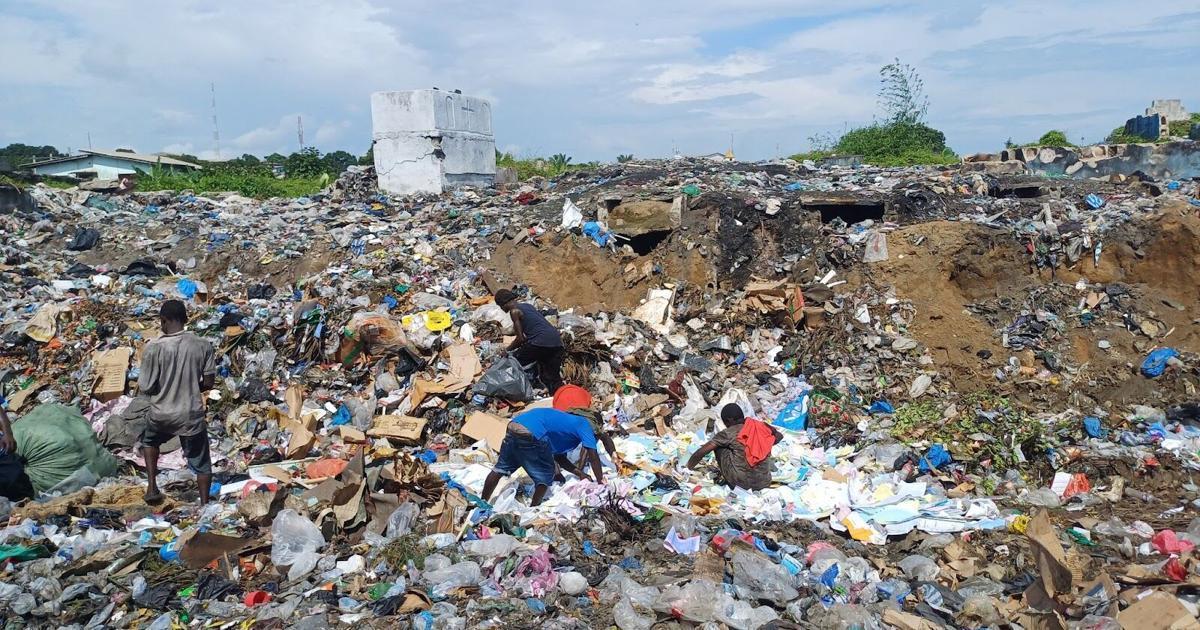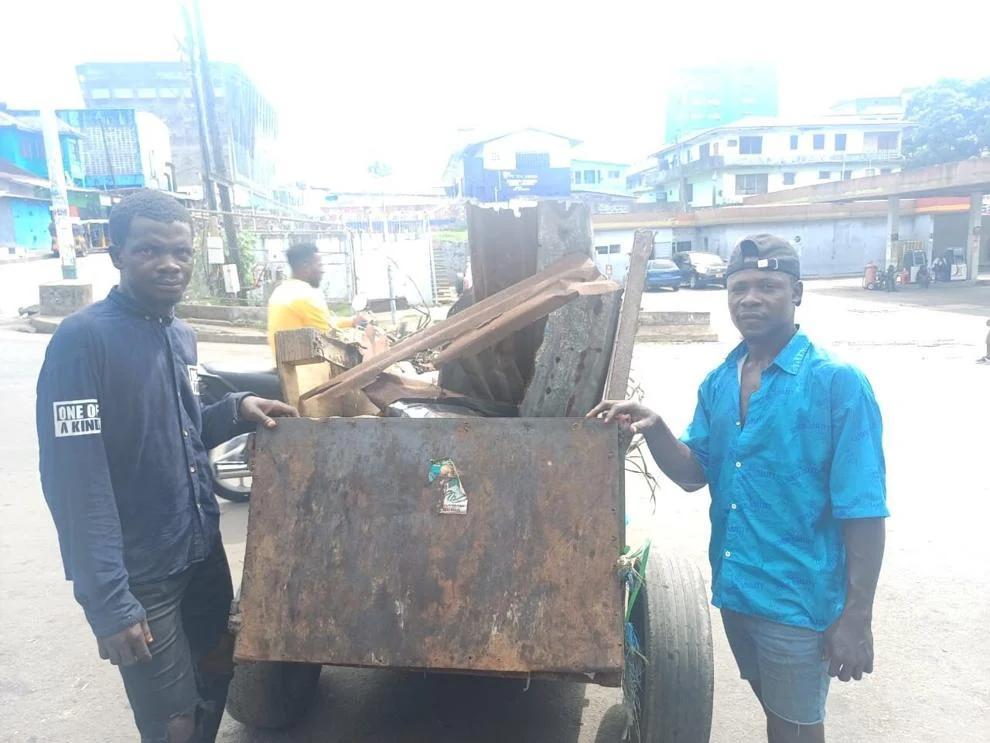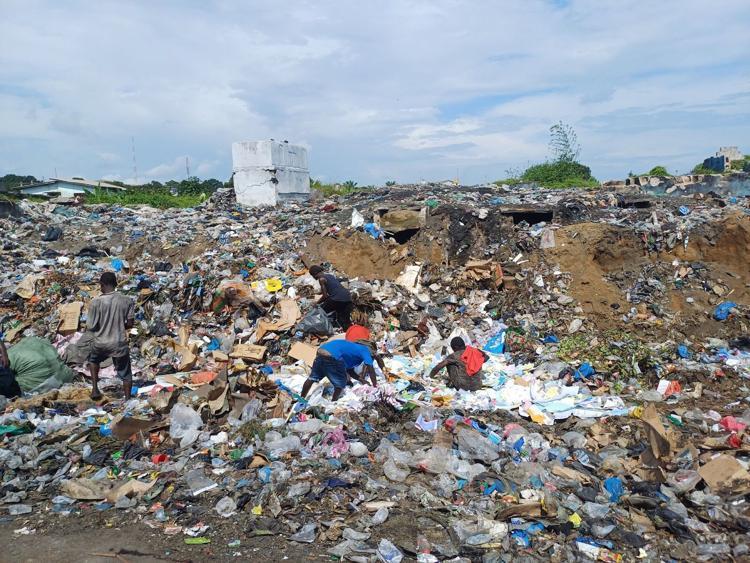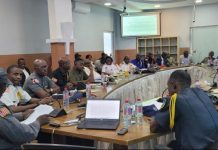Africa-Press – Liberia. Searching among plastics, bottles, clothes, and canes to sell by weight to recycling companies was never a dream job for Meshack Nebo. The twenty-seven-year-old became a waste picker when his former employer downsized him as a store boy.
“This work is so hard,” he says.” You spent the entire day picking among the dirt.” Per week, Nebo earns L$1,900.
In Liberia, waste picking is not a standard job. It is one of the least paid jobs. According to the World Economic Forum, they are responsible for collecting up to 60% of all plastics waste which are then recycled. Apart from keeping the environment safe and clean, their job also prevents greenhouse gas (GHG) emissions.
Despite this effort, waste pickers are less valuable, and suffer discrimination. Furthermore, they are exposed to pollution, exploitation, and other hazardous waste, such as medical waste, that should not be disposed of openly. Additionally, they work without protective gear such as nose masks, reflective jackets, hand gloves, and rainboots, which medical experts say is important to protect them from diseases.
“People collecting garbage with poor hand gear are prone to injury,” says Dr. Joyce Bartekwa Gwaikolo, an Infectious Disease specialist at the John F. Kennedy Medical Center. “When garbage continues to enter into the injury part, they develop tetanus.”
Liberia is among countries grappling with poor waste management. Illegal dumping is rampant. People take dirt from their homes and businesses to throw it in the streets or burn or bury the trash causing pollution, and clogging drains and water bodies.
Elsewhere in the world, people pay for waste collection services to local community-based Enterprises but in Liberia, it is difficult, leaving a huge task to the Monrovia City Corporation (MCC), and the Paynesville City Corporation (PCC) to collect garbage from the streets, holding points, and transfer stations. Whereas the Community-Based Enterprises (CBEs) should collect the trash from homes and businesses to the holding points, or the transfer stations and the City Corporations take them to the landfill.
Residents prefer taking their trash to throw at the roadside or give it to disadvantaged youth known as “Zogoes” who then throw it anywhere.
Another issue is waste sorting. Most of the trash collected is not sorted. Plastics, metals, and chemicals are all compiled together and taken to a transfer station or a landfill. Dr. Gwaikolo noted that not sorting waste is harmful to the environment and the waste pickers as well.
In Liberia, data on waste pickers is limited. However, CBEs do employ depending on their capacity. The International Labour Organization says there are more than 20 million waste pickers around the world — making them the largest workforce in the recycling industry — who recover up to 60% of all plastics globally.
Plastic waste in Monrovia consists of 14.2 percent of Monrovia’s waste, according to Research Gate, a Germany-based network of scientists and researchers that end up in landfills, drains, and waterbodies. These plastics are now rescued by waste pickers by collecting and taking them to recycling companies.
“Challenged with Medical Waste”
Medical waste should not be openly disposed of, according to the National Public Health Institute of Liberia guidelines. They are taken to a specialized dumping site and treated with care. It is a violation of Public law when it is disposed of at landfills, transfer stations, and holding points. It is mostly done by people who provide home treatment for patients. They are mixed with other waste and given to the disadvantaged youths [Zogoes] to throw away which ends up in the public dumping site. Unlike the CBEs who take the garbage from clients and dump it in the pushcarts and once they see medical dirt they immediately ask the client to get off.
J. Timothy Zangar, deputy supervisor of City Police assigned at the Center Street Holding point said they sometimes received medical waste when they did not check the waste when the individual came to dump. He says that is why they make sure that all waste is checked.
“But when you are not paying attention and somebody dumps dirt and you don’t check it and they dump medical waste you just have to get rid of it yourself since the person already left.”
According to him, people sometimes dump dead babies or even those who do abortions at home rapped the dead bodies and give them to the waste collector to throw them away at the site.
Morris Gono, Deputy Director of the Division of Environmental Occupational Health at the National Public Health Institute, said disposing of medical waste openly is a violation, and those caught are penalized.
“Medical waste is treated as specialized waste before even disposal, so there is no other way our medical waste can land in the landfill if it is a violation and those involved will have to come to book.”
Lack of Enforcement
The Monrovia City Corporation (MCC) and the Paynesville City Corporation are responsible for regulating trash. As per their safety requirements, waste waste pickers are supposed to be in protective gear when collecting trash. According to Fredrick Cole, Director General for the Services Program at the MCC, Monrovia is divided into three regions, the Northern, Southern, and Central regions, and each of these areas has assigned waste collectors that work daily.
The central region has 135, Sourtern, 72, and Northern 92. Central regions cover Monrovia and other parts, The Southern region(From Foreign Affairs, SKD Boulevard), and the northern region(Gabriel Taker Bridge to Red Hall Field. From Freeport to Stephen Tolbert Estate). According to the director, all those waste pickers employed with the City Corporation are given protective gear to wear.
“Over time, the MCC has been providing all of these things for these people and we are still providing them but they [Waste pickers] will say oh the heat is too much, this one my nose, the sun hot, so they will take them off.”
Many of the CBEs are based in Monrovia. The major role is to collect trash from homes and business centers, but over time, the CBEs have complained that people are refusing to hire their services and even those whom they provide services for refused to pay them. Cole added that the Monrovians have refused to subscribe to the CBEs, and prefer taking their trash to dump at the roadside or give them to the disadvantaged youths. “Management [MCC] has been finding it difficult because MCC is responsible to go take the garbage from the holding point to Whein town landfill. The CBEs should take it from the household to the holding point and the MCC take it from the Holding point to the landfill.”
“Before we had almost 32 CBEs but most of them were not capacitated so they felt on the wayside. We are encouraging more CBEs to come and register with the City cooperation. For now, we get less than 20 CBEs in all 3 regions.”
Currently, Monrovia has two holding points, Center and Front Streets, two transfer stations, the Fiamah, and Stockton Creeks, and one landfill.
CBEs Failure
Community-Based Enterprises (CBEs) and Small and Medium Enterprises (SMEs) have long complained that people were not subscribing to their services leading to breakdowns and causing some to shut down. To boost and build CBEs and SMEs’ effort to effectively collect waste in Monrovia, the European Union (EU) launched a U$ 3 million loan scheme for 21 CBEs and SMEs.
A New Narratives and Daily Observer investigation found that many of the CBEs and SMEs that took the loan were unable to pay because they diverted the money into something else rather than investing in the CBEs and SMEs business. Also, many of the CBEs do not follow the safety guidelines.
They do not provide protective gear for their employees. J. Saah Joe Kenedemah, head of the National Association of Community-Based Enterprises (NACOBE), admitted that most of the CBEs do not ensure the safety of their employees. He called on the MCC and PCC to ensure that waste pickers who do not wear protective gear should be penalized so as the CBEs who do provide protective gear for their employees.
No Dumping Site?
Currently, Liberia has only one functioning landfill, the Whetin Sanitary landfill. The landfill has lived its lifespan but it is yet to close because the government is challenged with dumping sites posing harm to the community and the residents. Just this year, there was a fire outbreak in the area prompting the Monrovia City Mayor, john-Charuk Siafa to call on the government to increase funding. The Cheesemanburg Landfill Urban Sanitation (CLUS), which was launched years ago is intended to replace the Whetin town landfill, but it is yet to commence due to a lack of funding.
According to Major Siafa, there exists a liability of U$2.56 million spent by the International Development Association (IDA) by MCC for the construction of the Cheesemanburg Landfill Urban Sanitation (CLUS) landfill Project. He says that if this money is not refunded by the government, the CLUS project would be rendered “ineligible expenditure,” thus leading to the total closure of the project.
“Financial sustainability remains a key challenge for the city, especially its Solid Waste Management (SWM) sector,” Siafa said during his confirmation hearing at the House of Senate.
With the current challenge, the government of Liberia is constrained to continue using the Whetin town landfill till the e Cheesemanburg Landfill Urban Sanitation (CLUS) landfill Project can be completed.
For More News And Analysis About Liberia Follow Africa-Press








